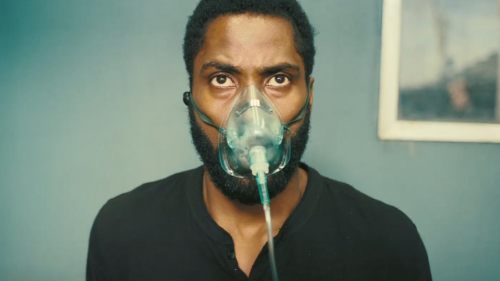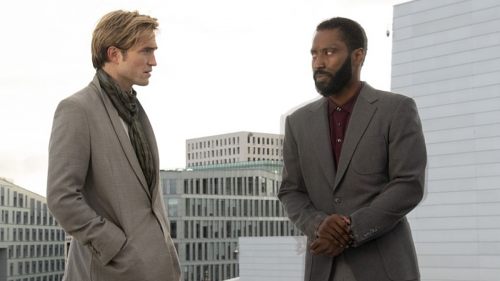INTERSTELLAR Movie Review: Ambitious, Inert, Beautiful, Flawed
“They should have sent a poet.”
That line from Contact is probably the best summation of Interstellar, a well-made, well-meaning movie that somehow manages to undersell the grandeur of interstellar travel. It’s a movie designed for people who watched the bedroom sequence in 2001: A Space Odyssey and wished there was more exposition about who built the room, how, why and what thread count was on that bed; Christopher Nolan, who aspires to Kubrick’s precision, cannot match his messy metaphysics. There’s an equation for every emotion in Interstellar, including love.
Set in the nearish future, Interstellar opens on an Earth where corn is pretty much the only crop, textbooks claim the Moon landing was faked and Matthew McConaughey’s Cooper was born just too late for mankind’s last bout of exploration. He’s trapped on a farm that is choked with dust and with a humanity that has lost the sense of adventure.
He’s trapped until strange phenomena begin appearing in his daughter’s bedroom, phenomena which seem supernatural but lead him to an old mountain base where he discovers the last vestiges of NASA, secretly planning a trip to another galaxy. It seems the same beings who communicated with Cooper have opened a wormhole near Saturn; on the other side of that wormhole is are planets that may be able to save humanity, which is currently doomed on an Earth whose oxygen is maybe forty years from being used up.
And so begins a grand adventure, as Cooper and the crew of the Endurance - Anne Hathaway as Dr. Brand, Wes Bentley and his beard as Doyle, David Gyasi as Romili and Bill Irwin as the voice of the cheeky computer TARS - rocket off into the unknown. And talk the whole way - the film is loaded down with so much exposition that you begin to wonder if the crew isn’t worried about using up their supply of O2. Interstellar is the kind of movie where characters not only stop to deliver science lessons to each other but also to muse philosophically about stuff like whether evil exists in the universe and what role love has to play in science.
The film is pretty good up until this point - brothers Christopher and Jonathan Nolan have sketched a future that is very purposefully familiar (it’s likely around 40 years in the future and everybody is dressed like we dress today) and create a family dynamic for Cooper that I quite like - but Nolan makes one strange, and I believe ultimately fatal choice late in the film. He decides to return to Earth to check in on Cooper’s family, who - thanks to the time-dilating effects a black hole named Gargantua has on the Endurance - have gotten all grown up while McConaughey stays the same age. Jessica Chastain is the grown-up version of daughter Murph, and Casey Affleck is the beaten-down adult version of son Tom, and their storyline adds nothing to the movie. At all.
It actually detracts from the film; there’s a climactic life or death struggle on an alien world that Nolan cross-cuts with activity on Earth, and the astonishing knack for cross-cutting he and editor Lee Smith (who also cut this film) showed on Inception is, frankly, gone. The back-and-forth here is clumsy, clunky, and undermines the tension that Nolan is masterfully building on that alien world. It also undermines the emotional tension of the whole story, the idea that Cooper has been forced to abandon his family for the greater good of humanity. Once the Endurance lifts off, Earth should be out of the picture completely. Instead we keep coming back there, the film's feet firmly planted in a storyline that goes nowhere.
Nolan once again uses IMAX in his film to give a greater sense of scale, and now that he’s moved out of Gotham City and into the universe it makes more sense than ever. There are gorgeous vistas in Interstellar, and Nolan knows exactly when to open up that aspect ratio and get big (my advice is to only see this film in IMAX), but he ends up being too quick on the trigger with his spectacle. Yes, there are grand visions in Interstellar, but Nolan keeps hurrying past them; 2001 works partially because Kubrick takes his time to show us the ships and the scenery, creating a sense of majesty in long, slow takes. Here Nolan brings us to the rings of Saturn in stunning IMAX and decides not to hold his shot for any amount of time. It’s a movie about the wonders of the universe without much of a sense of wonder. Interstellar is in too much of a hurry to get excited about anything other than physics.
At the center of it all is McConaughey, the best part of the movie. He’s got that perfect Chuck Yeager/The Right Stuff thing going on, a laid-back drawl that barely hides his vibrating excitement at going where no man has gone before. McConaughey is even able to make Cooper’s “I have to get home to my family!” gooniness work, and he’s the perfect emotional center for a movie that doesn’t quite know how to do emotions (they’re there, but they’re laid on as thick and clumsy as the lipstick on a seven year old getting into her mother’s make-up). He’s a hero with all of the honesty and idealism of our the sanitized figures in elementary school history books. That may sound like a knock, but it isn't - McConaughey can embody that kind of goodness without coming across as cloying or phony.
Interstellar tackles some big ideas along the way. Some are fascinating - fifth-dimensional space represented in three dimensions - and some are cringe-worthy - love as a universal constant - but all of the ideas are approached with honesty and intelligence. That alone makes me like and admire the movie. I just wish I could love it; Inception blew me away the first time through and has remained a film that moves me intellectually, cinematically and even emotionally. Interstellar stimulates intellectually, is dead on arrival emotionally and works well enough cinematically without truly wowing in the way it should.
I’m kind of reminded of how I felt walking out of The Dark Knight Rises: I wasn’t sure if I had just sat through a bad movie or not. I don’t think Interstellar is bad, but I do find myself wondering if it’s actually very good. Part of the problem is the film’s curious thematic inertness - nobody really learns anything over the course of the film (well, Murph learns her dad was right to abandon her, I guess), and the movie isn’t able to credibly balance its fascination with next-level science and its focus on gooey family stuff. Steven Spielberg was once attached to this movie and it’s not hard to see how he would have approached the film’s dual themes of the human adventure and familial love, but Nolan isn’t Spielberg. You understand that he's far more invested in the sequence where McConaughey must match his ship's rotations in order to dock with a wildly out of control orbiter than the sequence where a character back on Earth reveals a dark truth.
I can't tell you about that character, unfortunately. The most interesting stuff to discuss is stuff I can’t write about before release; there’s a lot to talk about in this film’s third act, some of it absolutely terrific, some of it oddly lifeless, all of it worthy of deep, serious discussion. The reality is that The Dark Knight Rises was a piece of shit, a film not worth the attention paid to it, but Interstellar, for all its faults, is filled with sequences, moments and concepts worthy of deep, lengthy essays and arguments about morality. All of which will have to come after release.
There are so many frustrating flaws in this enormously cerebral, wonderfully hopeful and massively ambitious movie. If good intentions were enough to make a movie a masterpiece, Interstellar would be the greatest work of Nolan’s career. That said, even with its many flaws, Interstellar is an often gorgeous, expertly put-together movie that demands to be seen on the biggest possible screen. And while many parts of Interstellar don’t work, the whole hangs together enough to be a movie that impresses with hard sci-fi nerdiness. If only that were enough to make it the great film we hoped for.
Note: thanks to Jeremy Smith, whose post-movie conversation led me to the quote that opens this review.



